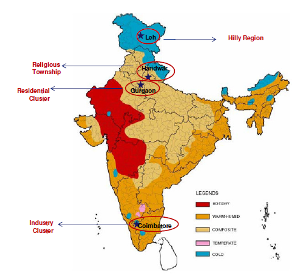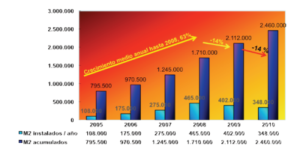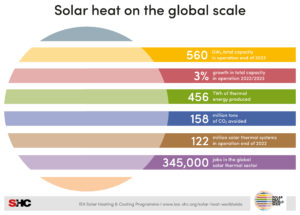India: ESCO Model gives Hope as Market Driver
January 2, 2011
Four cities with ESCO model
 Spanish-headquartered consultancy Mercados Energy Markets India (Mercados EMI) Pvt. Ltd. has carried out a study to establish a clear understanding of the Energy Service Company (ESCO) model for delivering customers with solar hot water. The assessment was conducted in the four cities seen on the map.
Spanish-headquartered consultancy Mercados Energy Markets India (Mercados EMI) Pvt. Ltd. has carried out a study to establish a clear understanding of the Energy Service Company (ESCO) model for delivering customers with solar hot water. The assessment was conducted in the four cities seen on the map.
Figure: Mercados EMI
The high initial costs of solar water heaters have been found to be “the major hurdle for large-scale installation of solar water heaters in India,” the authors argue in their study, “Development of an area-based Energy Service Company (ESCO) model for solar water heating in India”, published in September 2010 (see the attached document). An ESCO is defined as a company which installs, owns and operates a solar water heater, as well as provides solar hot water to a customer for a fixed fee. ESCOs can either be self-funded or borrow from a third party. This saves the customer the initial investment in a solar thermal installation.
The study consists of two major sections: The first looks at the potential for ESCO models in the above-mentioned target cities. The second part describes and analyses different types of ESCO business models. The study was accompanied by a stakeholder consultation among SWH hot water service providers in India. The aforementioned resulted in a list of risk and success factors for operating this kind of system:
- Monitoring and inspecting hot water services is critical in an SWH ESCO model, even though metering of hot water in some applications may be a challenge.
- To avoid commercial operation risks, it is extremely important to address payment default risks related to a certain category of end-users.
- The ESCO model is technologically and economically more efficient if it has to meet large demands of hot water, typically in industry facilities or large institutions.
- Rather than catering to individual demand segments, an area-based approach, comprising of a cluster of different types of demand segments, may better reduce the risks for an ESCO.
- Given the nature of business and the type of risks involved, an ESCO will need support from the government and should be accountable for any kind of financial incentive provided.
The risks involved would need to be appropriately addressed in order to ensure successful operation of the programme. The authors are convinced that a properly designed area-based ESCO programme could contribute significantly to the further development of solar water heating technology in the country.


